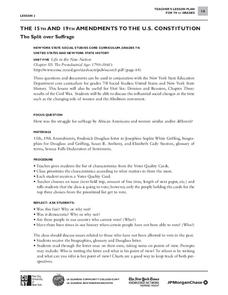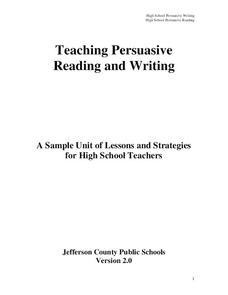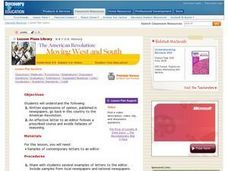City University of New York
The 15th and 19th Amendments to the U.S. Constitution
Who gets to vote? Learn more about struggles for suffrage throughout United States history with a lesson plan based on primary source documents. Middle schoolers debate the importance of women's suffrage and African American...
Curated OER
Write On!
Help empower your class by learning about the editorial section of the newspaper. They will have the option to also write to a politician. The goal is to teach students how to speak-up and express their opinions on important issues....
Benjamin Franklin Tercentenary
From Ben’s Pen to Our Lives
What would Ben do? Jumping off from the pseudonymous letters Ben Franklin fooled his older brother into publishing when he was still a teenager, young literary lovers dive into acting, writing, and addressing a local issue with wit and...
Constitutional Rights Foundation
Unauthorized Immigration and the US Economy
As part of a study of immigration and the U.S. economy, class members assume the role of newspaper editors to determine which submitted letters to print on their paper's editorial page to present a balanced view of the debate.
Curated OER
The Power of the Pen
Students discuss the personal and historical significance of journals, analyze the issues raised in a N.Y. Times article regarding Anne Frank's diary, and evaluate a Letter to the Editor written in response to the article.
Curated OER
It's Your Opinion
Students view "Inkheart: Speak Your Mind" by Cornelia Funke. They read several letters to the editor of a local newspaper and underline the 'opinion' portions of the letters. They discover how a literary selection can expand personal...
Balanced Assessment
Presidential Popularity
Media often misrepresent data and statistics to their advantage. This lesson asks scholars to analyze an article with misleading statistics. They use margin of error and mean data in their studies. Once they complete their analysis,...
Curated OER
A Way with Words
How do facts and opinions impact the news? After reading "How to Cover a War" from the New York Times, middle schoolers evaluate the claims in the article. They also consider the media's responsibilities in reporting during wartime....
Curated OER
Persuasive/Argumentative Essay vs. Opinion writing
Reinforce persuasive and argumentative writing skills with this lesson, which utilizes SchoolNet News Network's website/SNN Monthly magazine. Young writers review journalism writing styles that help them explain that writing a persuasive...
Constitutional Rights Foundation
Options for Affecting Public Policy
Letter-writing, e-mail and telephone campaigns, petitions, marches, meetings, with lawmakers. Options for influencing elected representatives are the focus of resource that details how to craft each of these approaches to influencing...
Bowland
Public Transport
"Statistics is the grammar of science" -Karl Pearson. In the assessment task, learners read a claim made by a newspaper and analyze its conclusions. They need to think about the sample and the wording of the given statistics.
Curated OER
Not Getting the News about the Stamp Act
How did American colonists react to the Stamp Act of 1765? Your young historians will examine primary source material by reading excerpts from a transcription of the Pennsylvania Gazette and then identifying the sentiments expressed...
Roy Rosenzweig Center for History and New Media
The Boston Massacre: You Be the Judge!
The importance of considering multiple perspectives of the same event is the big idea in this exercise that focuses on the Boston Massacre. Class groups examine photos of four depictions of the massacre, an English and an American...
Curated OER
Leaders, Laborers, and Other Perspectives of World War II
How did the women in France feel about their country’s involvement in World War II? Class groups are assigned a country involved in WWII, and individuals within the group adopt the point of view of leaders, laborers, businessmen, women,...
Jefferson County Schools
Teaching Persuasive Reading and Writing
With the increasing emphasis on persuasive and argumentative writing, the lessons and strategies in the sample unit are sure to prove valuable—whether you are new to or an experienced pro at teaching persuasive reading and writing.
Carolina K-12
Compulsory Voting
Should voting in the United States be compulsory? In 2004, fewer than 60 percent of eligible voters cast ballots in the American national elections. After reviewing arguments for and against compulsory voting, your young citizens will...
C-SPAN
Electoral College Pros/Cons and Alternatives
If every vote counts, why do we need the electoral college? Middle and high schoolers study the Constitutional precedent of the electoral college, as well as its place in historical and modern elections, with an engaging social studies...
Curated OER
Learning From World War II and Connecting It to the Present
Compare and contrast World War II to the modern Iraq war with this instructional activity. After watching a film, learners use supporting evidence to support their point of view of the conflicts. Using the internet, they create a...
Curated OER
Eastside Literacy Reading Lesson - Fact or Opinion
Analyze critical thinking skills that involve the ability to distinguish between fact and opinion through self-reflection. Higher education students will collect a newspaper article, advertisement, magazine article, tabloid article,...
Curated OER
Revising/Editing (3-5): Editing Marks. Part II and Literary Tools. Part II
Familiarize your class with commonly used editing marks. They apply the use of editing marks to a letter and examine different types of literary tools before making a note card resource for the tools. They add their own examples for each...
Center for History Education
Continuity or Change? African Americans in World War II
While World War II was a pivotal moment in history, historians debate its importance to the civil rights movement. Class members consider the implications of segregation and the war using a series of documents and a jigsaw activity....
Curated OER
The American Revolution: Moving West and South
Students examine several letters to the editor from both a local newspaper and national newspapers. After reviewing current letters, they write a letter to the editor of an 18th-century newspaper expressing their opinion about the...
Safe Drinking Water Foundation
Making a Difference
After learning about the effects of water pollution, your class will discuss ways to make people in their community aware of the importance of water conservation. Then, your young environmentalists will write a letter to the local...
Alabama Department of Archives and History
Montgomery Bus Boycott: We Would Rather Walk!
Have historians use primary sources to learn about the circumstances and implementation of the Montgomery Bus Boycott, and think about the issue of boycotts as a means of effecting social change. Wrap it up with a...

























